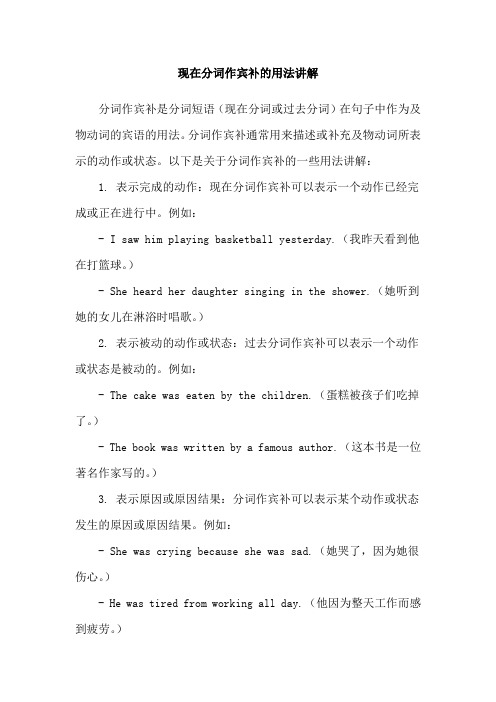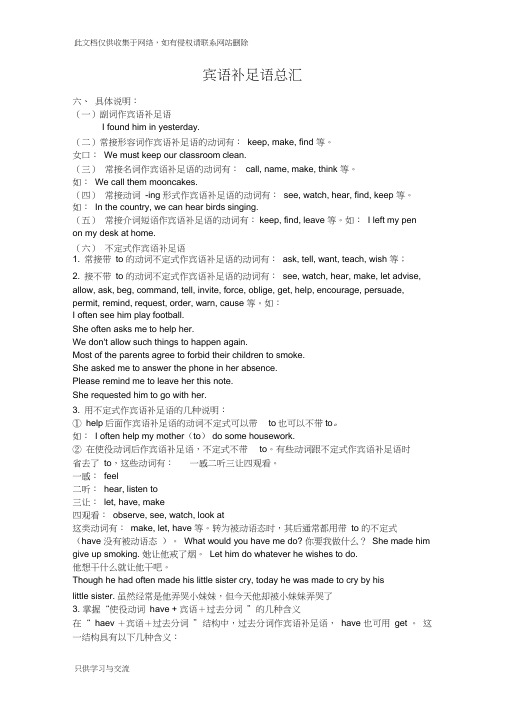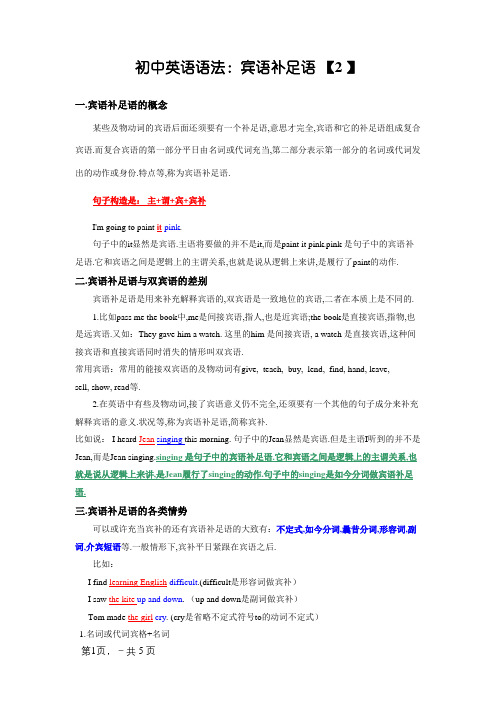宾补讲解
宾语补足语讲解

宾语补足语: 宾语补足语用来补充说明宾语,与宾语一起构成复合宾语。
可作宾语补足语的有名词、形容词、副词、介词和动词不定式等。
(一)、名词、形容词、副词、介词短语作宾语补足语。
1. We call him Jim. (名词)我们叫他吉姆。
2. We must keep our school clean every day. (形容词) 我们必须每天保持校园清洁。
3. Call him in, please. (副词)请叫他进来。
4. Leave it on the desk. (介词短语) 把它留在课桌上。
(二)、动词不定式作宾语补足语可分为三种情况:1. 跟带to 的不定式作宾语补足语。
常见的这类动词有:ask, tell, teach, want, invite, encourage等。
如:Tell Jane to sing us a song. 叫简给我们唱支歌。
2. 跟不带to的不定式作宾语补足语。
常见的这类动词有"一感 (feel )、二听(listento, hear ) , 三让( make, let, have ) , 四看( look at, see, watch, notice )如:Let 's have a rest. 让我们休息一会儿。
但这种结构变成被动语态时,to 必须加上。
如:He was seen to leave the room with a book in his hand. 有人见他手拿着一本书离开这个房间。
3. 跟带to 或不带to 的动词不定式作宾语补足语。
这类动词只有help 。
如:Can you help me (to) wash my clothes ? 你能帮我洗衣服吗?(三)、分词作宾语补足语可分为两种情况。
1. 现在分词作宾语补足语,经常表示正在发生的动作。
可跟这类补足语的动词有:see, watch,hear 等。
如:I hear somebody singing in the next room.我听见有人在隔壁唱歌。
宾语补足语讲解及练习

精心整理宾语补足语讲解一、定义:宾语补足语通常紧跟在宾语之后,对宾语进行补充说明。
二、句子结构是:主+谓+宾+宾补三宾语补足语的词语形式有:副词,形容,名词,介词短语,不定式(带to/不带to),分词(现在分词/过去分词)四、具体说明:(1)副词作宾语补足语如:Ifoundhim in yesterday.(2)形容词作宾语补足语如:Wemustkeepourclassroom clean.(3)名词作宾语补足语如:Wecallthem mooncakes.(4)介词短语作宾语补足语如:Ileftmypen onmydesk athome.(5)不定式作宾语补足语如:Sheoftenasksme tohelp her.Ioftenseehim play football.用不定式作宾语补足语的几种说明:①help后面作宾语补足语的动词不定式可以带to也可以不带to。
如:Ioftenhelpmymother(to)dosomehousework.②在使役动词和感官动词后作宾语补足语,不定式不带to。
这些动词有:一感:feel;二听:hear,listento;三让:let,have,make四观看:observe,see,watch,lookat如:I saw theboy climb thewall(过程)如:Theboss makes theboy work dayandnight.这类动词转为被动语态时,其后不定式符号to要重新加上去(注意have没有被动语态)。
Thoughhehadoften madehislittlesistercry,todayhe wasmadetocry byhislittlesister.虽然经常是他弄哭小妹妹,但今天他却被小妹妹弄哭了③表示心理状态的动词(consider,think,believe,discover,find,imagine,judge,suppose,prove等)后接不定式tobe+形容词或名词"结构作宾语补足语。
《宾语补足语讲解》课件

宾语补足语能够完善句子的语义,使句子更加完整明确。
3 修饰宾语
宾语补足语能够修饰和限定宾语,增强宾语的表达效果。
宾语补足语的位置
1 紧跟宾语
宾语补足语通常紧跟在宾语之后,与宾语构成一个整体。
2 需要注意
宾语补足语的位置与句子结构和动词特点有关,需要注意具体情况。
宾语补足语的识别方法
1 动词特征
通过解析典型的例句,帮助学生理解和运用宾语补足语。
2 练习巩固
设计各种形式的练习,巩固学生对宾语补足语的掌握和运用。
3 启发思考
引导学生思考不同宾语补足语的意义和使用,培养语感和表达能力。
宾语补足语的种类
形容词
形容词可以作为宾语补足语,描述和补充宾语的特 征、性质等。
副词
副词能够补充宾语的时间、地点、方式等相关信息。
介词短语
介词短语可以提供与宾语相关的具体背景、关系等。
不定式
不定式能够表示动作的目的、意图等,作为宾语的 补足语。
宾语补足语的作用
1 信息丰富
宾语补足语可以补充更多细节和信息,使句子更加具体。
通过分析动词的特征和用法,判断是否需要宾语补足语。
2 句子意义
根据句子的意义和语境,确定是否需要宾语补足语来丰富句子。
3 语法要求
一些特定的动词需要搭配宾语补足语,根据语法要求进行判断。
宾语补足语和宾语的关系
1 补充关系
2 依存关系
宾语补足语一般是为了补充和丰富宾语的意义。
宾语补足语依赖于宾语存在,宾语缺失则宾语补 足语也无法存在。
《宾语补足语讲解》PPT 课件
宾语补足语是句子中充当宾语的补充成分,起到丰富句意和完善语法结构的 作用。
(完整版)非谓语动词作宾语补足语讲解与练习(修订版)

非谓语动词作宾语补足语定义:宾语补足语通常是位于宾语之后,说明宾语的状态、特征的成分,多由名词,形容词、副词、不定式,动名词个分词充当.如:The sun keeps us warm.We call her Jenny.They found him out.Make yourself at home.They wish you to go with them.I heard him singing.You must get your hair cut.宾语+宾语补足语=复合宾语,宾语和宾语补足语之间在逻辑上往往有主表、或者主谓的关系.一、动词不定式作宾补。
1.V1 + sb. + to do sth.常用动词有:advise 建议allow 允许ask 叫,请bear 忍受beg 乞求cause 导致command 命令encourage 鼓励expect 期待forbid 禁止force 迫使get 使hate 讨厌help 帮助intend 想要invite 邀请leave 让like 喜欢mean 打算need 需要oblige 迫使order 命令permit 允许persuade 说服prefer 宁愿request 请求remind 提醒teach 教tell 告诉trouble 麻烦want 想要warn 警告wish 希望wait for 等would like 想要would love 想要would prefer 宁愿persuade (劝说)sb to do sth = persuade sb into doing sth温馨提示:1.advise, forbid,allow, permit 这四个词后既可以直接加动名词作宾语,也可以接不定式作宾语补足语,即构成doing sthadvise/ forbid/ allow/ permitsb to do sth2.fear, excuse, refuse, insist, hope, suggest, agree, decide, demand, thank, arrange 等动词后不可接sb to do sth。
宾语补足语讲解

宾语补足语(O b j e c t c o m p l e m e n t)用法归纳概念:英语中含有某些意义的动词跟了宾语后句子仍不完整,还须要一个补足成分,这种补足成分叫做宾语补足语。
宾语补足语是句子的主要成分,这样的句型为:主语+谓语动词+宾语+宾语补足语。
由名词、形容词、副词、介词短语充当宾语补足语,用以说明宾语的类属、性质、状态等意义;由非谓语动词即不定式、现在分词、过去分词充当宾语补足语,用以说明宾语的动作。
①当感官动词和使役动词,如:see hear notice watch hear observe, listen to, feel(感官动词)make have let get(使役动词)接宾补时,不定式的符号to必须省略。
但在被动语态中,动词后要加to。
主动语态:The policeman made him tell everything.被动语态:He was made to tell everything by the policeman.②感官动词see, hear, watch, notice, observe后面的宾语补足语既可跟不带to的动词不定式,也可跟现在分词,其区别在于前者表示“经常性的,习惯性的动作”,后者表示“正在发生的瞬间动作”。
I often hear her sing English songs in the room.Suddenly, Zhang Hua heard someone shouting “Fire! Fire!”③在help后,不定式可以带to,也可不带。
Lucy often helps her brother (to) learn English.④有些动词只能用现在分词作宾语补足语,如:keep, mind, prevent, stop。
动词find, catch等的宾语可由现在分词作宾语补足语。
She caught her son smoking a cigarette.We’d better keep the fire burning.I don’t mind you joking. I like it.The heavy rain prevented us coming here on time.I found him drinking my whisky.⑤hope, demand, suggest等动词后面不能接不定式作宾语补足语。
过去分词作宾语补足语讲解

过去分词作宾语补足语讲解过去分词作宾语补足语是英语语法中的一个重要概念。
在英语语法中,书写和语音是两个不同的事情,因此,有时候我们需要通过语法规则来理解一个句子的意思。
过去分词作宾语补足语的语法规则比较复杂,需要掌握一些基本概念和规则才能够正确地理解和使用它。
一、过去分词的概念二、宾语补足语的概念宾语补足语是指在一个句子中作为宾语的形容词、名词、介词短语或副词短语。
宾语补足语用来说明或补充宾语的意义,通常跟在要求宾语补足语的动词之后。
过去分词作宾语补足语的结构一般是由一个动词和一个过去分词组成。
例如:1. I found the door locked.2. She heard the news reported on the radio.在第一句话中,过去分词“locked”作为宾语补足语,修饰door这个名词。
在第二句话中,过去分词“reported”作为宾语补足语,说明news这个宾语的性质和来源。
1. 表示被动语态例如:“The door was locked”中,“locked”作为过去分词作为被动语态的一部分出现。
2. 表示完成的动作或事实3. 表示受到影响或被改变例如:“The weather has left the grass burnt”中,“burnt”作为过去分词表示草受到了天气的影响而变成了焦黑色的。
4. 表示被描述或评价的性质例如:“I found the soup tasted awful”中,“awful”作为过去分词作为宾语补足语表示这个汤味道很糟糕。
五、注意点过去分词作宾语补足语时,如果它所修饰的宾语有一定的主动性,那么句子的意思会与过去分词意思相反。
例如:“I found the door locked”中door是有被动性的,但是如果改成“I locked the door”就不能用过去分词作宾语补足语了。
总之,理解过去分词作宾语补足语的规则和应用对于学英语的人来说是十分重要的,在掌握这个知识点之后,可以更好地理解英语语法的基本结构和规则。
现在分词作宾补的用法讲解

现在分词作宾补的用法讲解分词作宾补是分词短语(现在分词或过去分词)在句子中作为及物动词的宾语的用法。
分词作宾补通常用来描述或补充及物动词所表示的动作或状态。
以下是关于分词作宾补的一些用法讲解:1. 表示完成的动作:现在分词作宾补可以表示一个动作已经完成或正在进行中。
例如:- I saw him playing basketball yesterday.(我昨天看到他在打篮球。
)- She heard her daughter singing in the shower.(她听到她的女儿在淋浴时唱歌。
)2. 表示被动的动作或状态:过去分词作宾补可以表示一个动作或状态是被动的。
例如:- The cake was eaten by the children.(蛋糕被孩子们吃掉了。
)- The book was written by a famous author.(这本书是一位著名作家写的。
)3. 表示原因或原因结果:分词作宾补可以表示某个动作或状态发生的原因或原因结果。
例如:- She was crying because she was sad.(她哭了,因为她很伤心。
)- He was tired from working all day.(他因为整天工作而感到疲劳。
)4. 表示伴随的动作或状态:分词作宾补可以表示一个动作或状态伴随着另一个动作或状态的发生。
例如:- They sat at the table, eating dinner.(他们坐在桌子旁边吃晚餐。
)- He walked into the room, holding a bouquet of flowers.(他手持一束花走进房间。
)需要注意的是,分词作宾补通常需要与及物动词配合使用,而且需要符合时态和语态的要求。
在句子中使用分词作宾补可以更加生动地描述动作或状态,使句子更加丰富和具体。
高中英语语法宾语补足语讲解

宾语补足语举例:I going to paint it pink.我打算把它涂成粉红色(选自《新概念英语第一册》)句子中的“it”显然是宾语。
但是主语将要做的并不是it,而是“paint it pink”。
“pink” 是句子中的宾语补足语。
它和宾语之间是逻辑上的主谓关系,也就是说从逻辑上来讲,是pink呈现了it的状态,让句子意思更加完整。
这里的宾语it与宾补pink 的关系是主语与表语的关系(即主系表结构),如大家所知,主系表结构是为了呈现主语的特点特征、状态、身份等信息。
本质意思是it is pink,形式表现是it pink。
句子中的“pink”是形容词做宾语补足语。
能够充当宾补的大致还有:不定式,现在分词,过去分词,副词,介宾短语。
一般情况下,宾补通常紧跟在宾语之后。
比如:I find learning English difficult.(difficult是形容词做宾补)I saw the kite up and down.(up and down是副词做宾补)Tom made the girl cry.(cry是省略不定式符号to的动词不定式)常跟复合宾语的动词有:call(叫),named(叫做),make(做),think(思考),find(找),leave(离开),keep(保持),nominate(任命),choose,elect(选举),define(定义),regard(认为),see(看),recognize(认出),treat,take,consider(考虑),look up,refer to(提到),accept(接受),acknowledge (承认),describe,depict(描述),represent(表现出),declare(宣称),denounce(指责),employ(雇佣),use(使用),show(展示),organize,express(表达)等。
宾语补足语高中英语讲解及习题

宾语补足语宾语补足语是用于增补说明宾语的成分。
宾语补足语经常放在宾语以后,和宾语一同组成复合宾语。
一、常有的能接宾语补足语的词语1.使役动词(1)使役动词 makemake 用作使役动词表示“使”时,可跟复合构造,即“ make 宾+语 +宾语补足语”,此中的宾语补足语能够是形容词、名词、不带 to 的不定式、过去分词。
The heavy rain made it impossible for us to go out.大雨使得我们没法出去。
He couldn ’ t make himself heard above the noise of the traffic在交.通喧闹声中他没法使自己让他人听到。
What makes the grass grow?什么使得草生长?★动词不定式作 make 的宾语补足语时要用省略 to 的形式,但假如用在被动语态中, to 必定不可以省略。
She was made to work twelve hours a day她.被迫每日工作十二个小时。
(2)使役动词 havehave 表示“使得 ,, ”,后来接宾语补足语,常用于以下构造:①have sb. do sth.使/ 让某人做某事②have sb. Doing sth.使/ 让某人向来做某事③have sth. Done 使/ 让某事被做;遭受某种不幸The teacher had the little boy write on the blackboard.老师让这个小男孩在黑板上写。
don’ t have the lights burning all the night.不要让灯彻夜亮着。
He had the bike repaired yesterday.昨天他让人修了自行车。
He had his leg broken in the match.在竞赛中他摔断了腿。
(3)使役动词 leaveleave 用作使役动词,表示“使/ 让,, 保持某种状态”,能够用形容词、名词、介词短语、分词作宾语补足语。
宾语补足语总汇知识讲解

宾语补足语总汇六、具体说明:(一)副词作宾语补足语I found him in yesterday.(二)常接形容词作宾语补足语的动词有:keep, make, find 等。
女口:We must keep our classroom clean.(三)常接名词作宾语补足语的动词有:call, name, make, think 等。
如:We call them mooncakes.(四)常接动词-ing 形式作宾语补足语的动词有:see, watch, hear, find, keep 等。
如:In the country, we can hear birds singing.(五)常接介词短语作宾语补足语的动词有:keep, find, leave 等。
如:I left my penon my desk at home.(六)不定式作宾语补足语1. 常接带to 的动词不定式作宾语补足语的动词有:ask, tell, want, teach, wish 等;2. 接不带to 的动词不定式作宾语补足语的动词有:see, watch, hear, make, let advise, allow, ask, beg, command, tell, invite, force, oblige, get, help, encourage, persuade, permit, remind, request, order, warn, cause 等。
如:I often see him play football.She often asks me to help her.We don't allow such things to happen again.Most of the parents agree to forbid their children to smoke.She asked me to answer the phone in her absence.Please remind me to leave her this note.She requested him to go with her.3. 用不定式作宾语补足语的几种说明:①help后面作宾语补足语的动词不定式可以带to也可以不带to。
宾语补足语讲解(整理)

初中英语语法:宾语补足语【2 】一.宾语补足语的概念某些及物动词的宾语后面还须要有一个补足语,意思才完全,宾语和它的补足语组成复合宾语.而复合宾语的第一部分平日由名词或代词充当,第二部分表示第一部分的名词或代词发出的动作或身份.特点等,称为宾语补足语.句子构造是:主+谓+宾+宾补I'm going to paint it pink.句子中的it显然是宾语.主语将要做的并不是it,而是paint it pink.pink 是句子中的宾语补足语.它和宾语之间是逻辑上的主谓关系,也就是说从逻辑上来讲,是履行了paint的动作. 二.宾语补足语与双宾语的差别宾语补足语是用来补充解释宾语的,双宾语是一致地位的宾语,二者在本质上是不同的.1.比如pass me the book中,me是间接宾语,指人,也是近宾语;the book是直接宾语,指物,也是远宾语.又如:They gave him a watch. 这里的him 是间接宾语, a watch 是直接宾语,这种间接宾语和直接宾语同时消失的情形叫双宾语.常用宾语:常用的能接双宾语的及物动词有give, teach, buy, lend, find, hand, leave,sell, show, read等.2.在英语中有些及物动词,接了宾语意义仍不完全,还须要有一个其他的句子成分来补充解释宾语的意义.状况等,称为宾语补足语,简称宾补.比如说: I heard Jean singing this morning. 句子中的Jean显然是宾语.但是主语I听到的并不是Jean,而是Jean singing.singing 是句子中的宾语补足语.它和宾语之间是逻辑上的主谓关系,也就是说从逻辑上来讲,是Jean履行了singing的动作.句子中的singing是如今分词做宾语补足语.三.宾语补足语的各类情势可以或许充当宾补的还有宾语补足语的大致有:不定式,如今分词,曩昔分词,形容词,副词,介宾短语等.一般情形下,宾补平日紧跟在宾语之后.比如:I find learning English difficult.(difficult是形容词做宾补)I saw the kite up and down. (up and down是副词做宾补)Tom made the girl cry. (cry是省略不定式符号to的动词不定式)1.名词或代词宾格+名词They named the baby Jim.We call him Tom.2.名词或代词宾格+形容词They painted the wall white.I always find her happy and gay(高兴).3.名词或代词宾格+介宾短语People praised(赞扬)him as a national hero.The next morning I found him at his machine again.☆4.名词或代词宾格+动词不定式We asked the teacher to explain the difficult sentences again.The teacher helped him(to)see his error(错误).☆5.名词或代词宾格+分词(如今分词或曩昔分词)I heard somebody knocking at the door.He had his ankle sprained while playing football.他踢足球时把脚踝扭伤.请思虑:为什么第一句用的是如今分词而第二句用的是曩昔分词呢四.什么动词后可有宾语补足语:1.在表示心理状况的动词后作宾语补足语.这类动词有:consider, think, believe, discover, find, imagine, judge, suppose, prove等.这类动词后的不定式平日是"to be+形容词或名词"构造,think, consider, find后的to be常可省略. We consider him (to be) a good teacher. 我们以为他是一个好师长教师.He proved that theory(to be) very important. 他证实谁人理论是很主要的.I thought her(to be) nice and honest the first time I met her. 我第一次见到她的时刻就以为她人很好,很说谎.2.在表示情绪状况的动词后作宾语补足语.这类动词有:love, like, prefer, hate, want, wish, expect等.I'd prefer you to leave him alone. 我愿望你不要打搅他.☆3.留意:hope, demand, suggest等动词后面不能接不定式作宾语补足语.I hope you can give me a hand. (宾从)我愿望你能帮我一把.I wish you to give me a hand. 我愿望你能帮我一把.Mr. Li suggested that she should not go there alone. (宾从)李师长教师建议她不要独自去那边.He required us to be present at the meeting. 他请求我们出席会议.☆不定式作宾语补足语的情形:1. 常接带to的动词不定式作宾语补足语的动词有:ask, tell, want, teach, wish等;2. 接不带to的动词不定式作宾语补足语的动词有:see, watch, hear, make, let advise, allow, ask, beg, command, tell, invite, force, oblige, get, help, encourage, persuade, permit, remind, request, order, warn, cause等.如:She often asks me to help her.We don't allow such things to happen again.Most of the parents agree to forbid their children to smoke.I often see him play football.(to省略了)3. 用不定式作宾语补足语的几种解释:①help后面作宾语补足语的动词不定式可以带to也可以不带to.如:I often help my mother(to) do some housework.②在使役动词后作宾语补足语,不定式不带to.这些动词有:一感二听三让四不雅看.一感:feel二听:hear, listen to三让:let, have, make 四不雅看:observe, see, watch, look at .这类动词还有:make, let, have等.转为被动语态时,厥后平日都用带to的不定式 (have没有被动语态).What would you have me do?你要我做什么?She made him give up smoking.她让他戒了烟.Let him do whatever he wishes to do.他想干什么就让他干吧.Though he had often made his little sister cry, today he was made to cry by his little sister.(变成被动语态要把to加上)固然经常是他弄哭小妹妹,但今天他却被小妹妹弄哭了☆分词作宾语补足语用如今分词作宾补,解释宾语是动作的发出者,形成逻辑上的主谓关系;用曩昔分词作宾补,表示宾语是动作的推却者,组成逻辑上的动宾关系.1. 跟分词作宾补的动词有:catch, have get, keep, hear, find, feel, leave, make, want, start, notice, observe, watch, set等.例如:There was so much noise that the speaker couldn’t make himself heard.因为十分吵闹,讲话人没法让人听到他的声音.When he awoke, he found himself being looked after by an old woman.他醒来的时刻发明一位老迈娘正在照料他.2. 几种用曩昔分词作宾语补足语的情形解释:①表示“意欲;敕令”的动词如 like, want, wish, order 等,可用曩昔分词作宾语补足语.The father wants his daughter taught the piano. 这位父亲想让女儿学钢琴.②感官动词see, hear, notice, observe, watch, feel, 等后,可用曩昔分词作宾语补足语.例如:Isaw an old man knocked down by a car just now. 适才我看到一位白叟被车撞倒了.③使役动词 have, get, make, leave, keep 等后,可用曩昔分词作宾语补足语.例如: Have you got your films developed? 你拿菲林去冲洗了没有?☆控制“使役动词 have + 宾语+曩昔分词”的几种寄义在“ have +宾语+曩昔分词”构造中,曩昔分词作宾语补足语, have 也可用 get .这一构造具有以下几种寄义:①意为“主语请别人做某事”.例如:He wants to have his eyes examined tomorrow. 他明天想去检讨眼睛.(“检讨”的动作由大夫来进行)②意为“主语遭受.遭受某一不高兴.不测的工作”.例如:Be careful, or you'll have your hands hurt. 当心,不然会弄伤手的.③意为“使完成某事”,工作既可所以别人做完,也可以由主语参与完成.He had the walls painted this morning. 他今早把墙漆了.(主语本身可能参与)。
- 1、下载文档前请自行甄别文档内容的完整性,平台不提供额外的编辑、内容补充、找答案等附加服务。
- 2、"仅部分预览"的文档,不可在线预览部分如存在完整性等问题,可反馈申请退款(可完整预览的文档不适用该条件!)。
- 3、如文档侵犯您的权益,请联系客服反馈,我们会尽快为您处理(人工客服工作时间:9:00-18:30)。
2. 动词-ed形式作宾语补足语
She found the door broken in when she came back. My grandfather had his old house rebuilt.
She had her wallet stolen yesterday.
She felt a great weight taken off her mind. He was trying to make himself understood.
3.动词不定式作宾语补足语
• The teacher told us to do Exercise 1. I want both of you to go. We helped her (to) repair her bike. • I heard someone knock at the door three times . • 变为被动语态应为: • Someone was heard to knock at the door three times .
4.注意: it 做形式宾语
• 结构: 主+谓语+ it +宾补+真正宾语 • I found it pleasant to be with your family. • We think it our duty that we should help the poor.
5. with+宾语+宾补
5.They would not allow him _____ across the enemy line. A. to risk going B. risking to go C. for risk to go D. risk going 6. I couldn’t do my homework with all that noise____. A.going on B. goes on C. went on D. to go on 7. With a lot of difficult problems_____, the newlyelected president is having a hard time. A.settled B. settling C. to settle D. being settled 8. The doctor asked him not to leave his wound ______. A. expose B. exposed C. to expose D. exposing
【注意】用作宾语补足语的名词表示独一无二的职 位、头衔、称谓时,其前不 能用冠词。例如: John was elected Chairman of the students’ union. Isident of the United States for the second time.
1.I once heard this song ______ in Japanese. A. is sung B. sang C. sing D. sung 2.When I came in, I saw Dr. Li _______ a patient. A. examine B. to examine C. examining D. examined 3. The manager discussed the plan that they would like to see _______the next year. A.carry out B.carrying out C.carried out D.to carry out 4. Charles Babbage is generally considered _______ the first computer. A. to invent B. to be inventing C. to have invented D. having invented
宾语补足语
object complement
宾语补足语是位于宾语之后,说明宾语的状 态、特征的成分,多由名词、形容词、副词、 不定式,动名词和分词充当。
如: The sun keeps us warm. I heard him singing. You must get your hair cut. We call her Jenny. They found him out. Make yourself at home. They wish you to go with them.
动词+宾语+宾语补足语 (n./adj./doing/done/to be/介词短语) 2) You must get the work ____ before Friday. A. do B. to do C. doing D. done
动词+宾语+宾语补足语 (n./adj./doing/done/to be/介词短语) 3)_____ the room, the nurse found the tape-recorder ______. A. Entering; stealing B. Entering; gone C. To have entered; being stolen D. Having entered; to be stolen
4) With the matter settled, he went home. 5) With a lot of work to do, he had to stay up very late.
动词+宾语+宾语补足语 (n./adj./doing/done/to be/介词短语) 1) I have had my bike _____, and I’m going to have somebody _____ my radio tomorrow. A. repair; to repair B. repairing; to repaired C. repaired; repair D. to repaired; repairing
考试热点: 1)动词 –ing 形式作宾补
这时 - ing 形式和句子的宾语之间存在着逻辑上的 主谓关系,并且 - ing 形式表示宾语正在进行的动 作。 Do you hear someone knocking at the door? I’m sorry to have kept you waiting for so long. I could feel the cold wind blowing on my face.
1)He was working there with only a shirt on. 2) The woman with a baby in her arms is Tom’s mother. difficulty in finding my house.
3)With Tom leading them, they had no
动词+宾语+宾语补足语 (n./adj./doing/done/to be/介词短语) 4) We are pleased to see the problem ______ so quickly. A. settled B. having been settled C. be settled D. settling
